Navigating the complex world of healthcare and finances for an aging loved one is a significant responsibility, and ensuring you have the proper legal authority to act on their behalf is paramount.
Without the appropriate documents in place, you could face frustrating and even heartbreaking obstacles when trying to manage their care or make critical decisions.
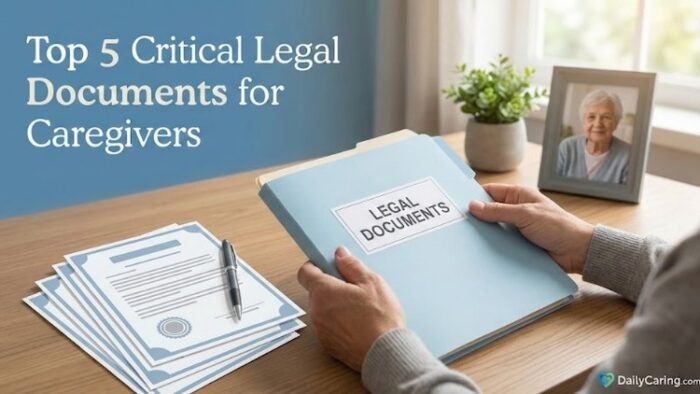
This article outlines the five essential legal documents every caregiver needs, providing you with the knowledge and tools to secure your loved one's future and protect their wishes.
Don't Wait For a Crisis to Get Your Legal Documents In Order
One day, your loved one won’t be able to manage their own legal matters and will rely on you to act in their best interests.
Planning and getting the legal stuff squared away before a crisis allows you and your loved one to stay in control of critical decisions while you still have options. This will keep the lawyers and courts out of your family matters until you are ready for them.
The Five Most Important Legal Documents for Caregivers
There’s a lot for caregivers to manage, so we’ve narrowed this particular list to the five most important legal documents for caregivers to understand and act on.
*This list doesn’t cover every situation and shouldn’t be considered legal advice, but it will help you cover the basics when it comes to legal matters.
1. A Power of Attorney (POA)
A Power of Attorney (POA) is a crucial legal document that allows your loved one (the “principal”) to appoint you or another trusted person (the “agent” or “attorney-in-fact”) to make decisions and manage affairs on their behalf if they become unable to do so themselves.
It is a foundational tool that grants you (the caregiver) the legal authority to handle financial matters, such as paying bills, managing investments, and filing taxes.
It's essential to know that a POA must be created while your loved one is still mentally competent, and the specific powers granted can be broad or limited to certain actions (ensuring the agent can act effectively and in the principal's best interests when it's needed most).
- This allows your older adult to authorize someone to make legal decisions when they are no longer competent.
- A POA covers the authority to make financial decisions on someone's behalf.
2. Durable Power of Attorney for Health Care (also known as a health care proxy)
A Durable Power of Attorney for Healthcare (also known as a Healthcare Proxy or Healthcare Agent designation) is a specific legal document that allows your loved one to name a trusted person to serve as their voice and make medical decisions on their behalf if they become incapacitated and cannot communicate their wishes.
The “appointed agent” works closely with doctors to choose treatments, manage care, and ensure that any decisions align with the loved one's previously expressed values and preferences, often outlined in a separate living will.
It is a foundational document for caregivers, as it provides the apparent legal authority needed to advocate effectively in medical settings, preventing delays in care and ensuring that your loved one's healthcare journey is guided by someone who knows and respects the patient's desires.
- This allows your older adult to authorize someone to make all decisions regarding health care, including choosing health care providers, medical treatment, and end-of-life decisions.
- This power only goes into effect when your older adult is unable to make decisions for themselves.
3. A Living Will or Advance Directive
A Living Will, often part of a set of documents called an Advance Directive, is a legal document that explicitly outlines your loved one's specific wishes regarding their future medical care, particularly the types of life-sustaining treatments they would want or want to avoid if they become terminally ill, permanently unconscious, or are otherwise unable to communicate their decisions.
Unlike a Healthcare Power of Attorney, which appoints an agent to make decisions, a Living Will speaks directly to healthcare providers about end-of-life care, providing clear instructions on matters such as resuscitation, mechanical ventilation, tube feeding, and palliative care.
For a caregiver, this document serves as an essential guide, removing the burden of guesswork during an emotional crisis. It ensures you can honor your loved one's choices with confidence and avoid making these profound decisions on your own.
- This allows your loved one to state, in advance, what kind of medical care they do and do not want to receive.
- A living will also covers what life-support procedures they would not like to have.
- A living will is put into practice when a person isn’t able to express their wishes on their own.
4. A Living Trust
A Living Trust is a legal arrangement created by your loved one (the “grantor”) that places their assets (such as a home, investments, or bank accounts) into a trust managed by a designated person (the “trustee,” often themselves initially, and then a successor trustee like you) for the benefit of named beneficiaries.
For a caregiver, the critical feature is that if your loved one becomes incapacitated, the named successor trustee can seamlessly step in to manage the trust's assets without the need for a court-appointed conservatorship or guardianship, ensuring bills are paid, property is maintained, and financial affairs are handled without interruption.
Unlike a will, which only goes into effect after death, a living trust provides a powerful mechanism for managing a loved one's finances during their lifetime and allows the assets in it to bypass the often lengthy and public probate process after they pass away.
- This allows your older adult (the grantor) to create a trust and appoint someone (a trustee) to manage the trust assets when they aren’t able to manage their finances.
- A person or a financial institution can be the trustee.
5. A Will
A Will, formally known as a “Last Will and Testament”, is a fundamental legal document that explicitly states your loved one's wishes for the distribution of their assets and property after they pass away, ensuring their possessions are transferred to the people or organizations they choose (their beneficiaries).
For a caregiver, understanding the contents of a will is crucial, as it often names an executor (the person responsible for carrying out these instructions), which may include you, and can also appoint a guardian for any minor children or dependents, providing clear direction and preventing family disputes during a difficult time.
It is essential to know that a will only becomes active upon death and does not cover the management of affairs during your loved one's lifetime. Unlike a living trust, it must go through the court-supervised probate process to be validated, which can be public and time-consuming.
- An older adult’s will names an executor and the beneficiaries.
- The executor is the person who will manage your older adult’s estate at the time of death.
- Beneficiaries will receive the estate at the time of death.
Essential Legal Documents for Seniors: A Quick Reference Guide for Caregivers
Navigating the legal responsibilities of caregiving can feel overwhelming, especially when you're planning for an uncertain future. To help you protect your loved one’s wishes and ensure you have the authority to act when it matters most, we’ve summarized the five most critical legal documents every family should have in place.
Use the guide below to understand what each document does, when it takes effect, and how it provides essential peace of mind for both you and your senior.
| Legal Document | Primary Purpose | When It Takes Effect | Key Benefit |
|---|---|---|---|
| Power of Attorney (POA) | Authorizes an agent to manage financial affairs and make legal decisions. | Upon Incapacity (Or as specified) |
Ensures bills are paid and financial matters stay on track without court delays. |
| Durable POA for Health Care | Names a proxy to make medical treatment and end-of-life decisions. | Upon Incapacity Only when unable to speak |
Ensures medical care aligns with the senior's values and wishes. |
| Living Will / Advance Directive | States specific wishes regarding life-sustaining treatments and procedures. | Upon Incapacity During terminal illness |
Removes the emotional burden and guesswork from family members. |
| Living Trust | Appoints a trustee to manage assets and property for the senior's benefit. | Immediate Continues through incapacity |
Avoids the public and expensive probate process for the estate. |
| Last Will and Testament | Names an executor to distribute assets to chosen beneficiaries. | Upon Death Only after passing |
Provides a clear legal roadmap for asset distribution and names guardians. |
What Happens If You Don’t Plan Ahead
Suppose you don't plan, and your loved one's legal affairs are not in order before a person becomes incapacitated. In that case, family members must ask a court to appoint a conservator or guardian, which can be messy and time-consuming.
A conservatorship can be difficult for families because almost every action or decision on behalf of your older adult must be court-supervised and approved.
VIDEO: The 5 Essential Legal Documents for Caregivers
Legal Documents for Caregivers – How to Get Started
For legal matters, hiring an elder law attorney is always recommended. It’s also smart to do your own research so you understand what’s happening.
In addition, you can usually seek advice on legal issues from social workers or clergy, free of charge.
Frequently Asked Questions
Free State-Specific Legal Forms: Get Your Official Documents Today
Legal requirements for documents such as Power of Attorney and Advance Directives can vary significantly from one state to another, making it difficult to know whether you have the right paperwork. To simplify this process, we’ve created a specialized tool to help you find the exact, legally recognized forms required by your state.
By selecting your state below, you can bypass the confusion and access official, free resources from trusted organizations to ensure your loved one's medical and financial wishes are fully protected and legally binding.
Legal documents are state-specific. Select your state below to find the official, free advance directives and legal aid resources in your area.
Official free resources for your state:
⬇ Download Advance Directive PDF (via CaringInfo) 📋 AARP Free State Forms Registry ⚖ Find Local Legal Aid & POA HelpConclusion
Taking these steps to get your legal documents in order may feel daunting, but the profound peace of mind it brings is immeasurable. You are not just filling out paperwork; you are building a foundation of clarity, protection, and respect for your loved one's wishes.
This proactive effort is one of the most powerful acts of love a caregiver can provide, ensuring you can navigate future challenges with confidence and legal authority. Don't wait for a crisis – use this guide to start the conversation today and secure the peace of mind that comes with being fully prepared.
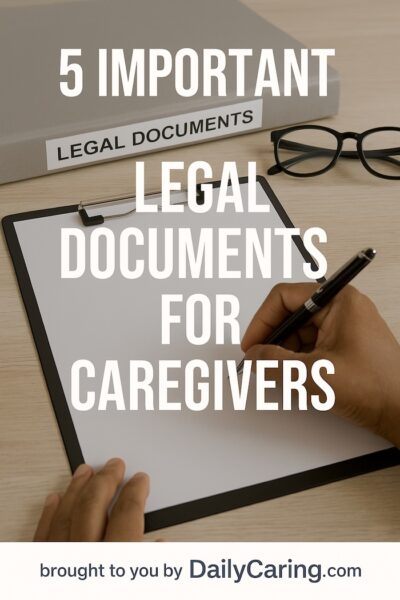
Recommended for you:
- What is a Power of Attorney and Why Do Seniors Need One?
- What Happens When Someone Dies Without a Will?
- What Is a Living Will and Why Do Seniors Need One?
About the Author

Chris is a seasoned healthcare executive and entrepreneur from the Pacific Northwest. He strongly advocates for older adults and the caregivers who serve them. Chris has personal experience caring for his father, who had dementia. Chris is an avid outdoorsman; if he's not in his office, he can usually be found on a golf course or in a garden out west somewhere.











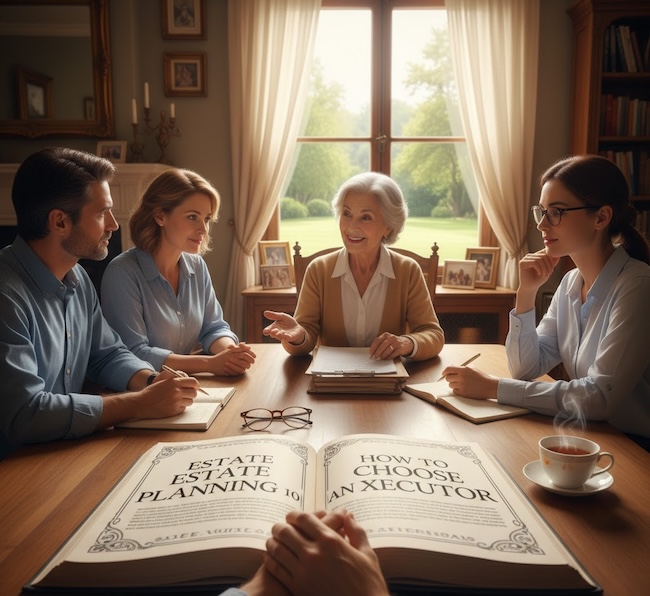
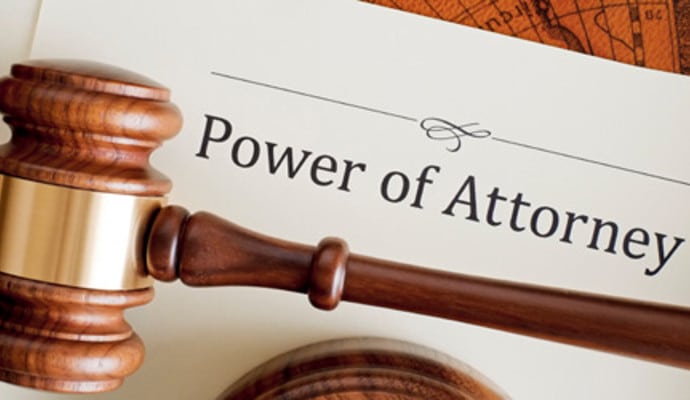
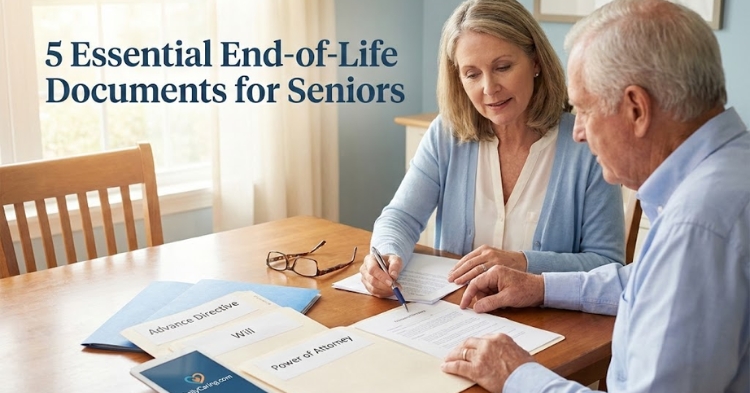
I am a Notary Public in Tucson, AZ. If the loved one already has dementia, it is too late for them to be able to answer the Notary’s questions and for them to be able to appoint a person to hold the POAs. That is when an Elder Law attorney is need to establish guardianship.
You also need a back up person as a POA plus you need beneficiaries.
In addition to the 2 POAs, the article lists, you also need a Mental Health POA.
More than once I was called to a facility by a panicked family with a loved one who was not able to answer the questions!
My job is to establish the identity of the signer, establish that he or she understands what a POA is and what the person they have selected will do for them and that they are signing of their own free will and not under duress. I often asked the family members to l eave the room in order for the signer to be able to tell me the truth.
One time, the husband was unresponsive and the wife was in tears on the phone with Wells Fargo. The bank rep she was speaking too told her to tell me to let her sign her husbands name to the titles and bank documents and for me to notarize that signature. Of course, I refused. Found out a month later that a male Notary in our area came, charging her an additional $65 which is illegal, and did what the bank asked! Completely illegal.
Thanks for sharing how things work when notarized signatures are needed. It’s helpful to know that it needs to be done as early as possible, while the person can still make decisions for themselves, or there needs to be another POA available.
[…] needs help from from an attorney, there are requirements that should be accomplished. First, the essential legal documents that would be helpful in finding the best and most convenient care for the senior that would give […]